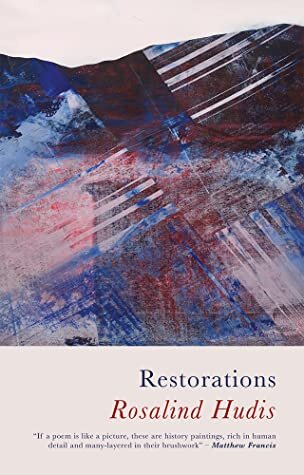Restorations

Restorations by Rosalind Hudis. Bridgend, Wales: Seren, 2021. 72 pp. £9.99. (paperback)
In her essay “How I write poetry” published at the beginning of 2021 in Poetry Wales, Rosalind Hudis concludes with a reference to Alice Oswald’s notion of poetry as “carving from sound.” Indeed, writes Hudis,
poetry springs from the oral music of language…. The basic score is breath itself which by its very nature forms the music into poetic lines. Through these musical elements, language can reach to levels that can’t be articulated by words alone, multiplying, like an acoustic chamber, the resonance of imagery.
The poems in Hudis’s most recent collection, Restorations, confirm her as a poet of the physical, of the infinite details of the world as it presents itself to us through our senses: sounds, shapes, textures, colors, odors—particularly odors, which to my mind are too often lacking in contemporary poetry. Hudis’s poems do not stop with the senses, but that is where they begin, so the senses present, I think, the best point of entry into her work.
Almost any poem in Restorations provides evidence of Hudis’s skill in bringing out with her words the physicality of our world: “the slow curve it takes/to furl ‘f’s” (“Fitzroy’s Barometer”), “When you varnish me with meaning, remember/the grit under my nails” (“The Artist Mixes Colour in the Renaissance”), “Three adjectives up/from plastic” (“Consolidant”), “so, no, their daughters/may not paint the room black” (“Interior”), “When the painting arrived on a stretcher” (“Inherent Vice”), or “a moulting rug/that still smelt of your last dog” (“What the Burglar Took”).
Such language could easily draw a less accomplished poet into what Adair Brouwer calls Poetryworld, that “hermetic, overperfumed dimension” free of “vulgarity or surprise … brand names,” etc. Hudis avoids this trap; she is not afraid of the contemporary and mundane, words like “hard-drive,” “down-grade,” “tummy zone.” Her poems are dense and sometimes difficult, but her language is restrained; it is not of Poetryworld: it is not enamored of itself and it does not suffocate. Rather, it surprises and disturbs, but just sufficiently to make us sit up and pay attention so that the poet can then open the poem to draw us into its subject.
Among all the excellent poems in Restorations, to my mind it is “Isinglass” that most perfectly displays Hudis’s mastery of her art and best reveals her method. Isinglass—though its meaning can be gleaned from the poem, yes, I did look it up—is a collagen extracted from fish bladders, originally exclusively those of sturgeons. It is used to clarify beer and wine, and as a glue; Russian isinglass in particular is used in the preservation and restoration of parchment and paintings. Hudis’s unnamed persona in the poem presents the substance: “yellowish, translucent, smells faintly of fingers/warmed against a crotch.” Here, Hudis, poet of the physical; ten words to make us see and, yes, smell her ostensible subject, but also to lead us elsewhere. Does isinglass really smell “faintly of fingers/warmed against a crotch”? And why does the poet write “I soften it slowly on so little fire”? Why “so little” and not simply “small” or “low”? As in Hudis’s other poems, these details are precise, charged, and necessary.
If in a rush to get to the poem we missed the epigraph, “(Leningrad 1941,)” when we arrive at the second stanza, we can no longer ignore it:
My husband restores art at the Palace
but today he braces their windows with paper strips,
…
We hold everything together with shreds.
This is the first winter of the Siege of Leningrad. Hudis’s choice of words to describe the smell of isinglass is no accident. Anyone who has known a true winter will recognize instantly that the crotch is the best place to warm icy fingers. The “so small fire” on which it is warmed is of course a starvation fire. With a single word Hudis wraps a chill around her poem before she goes on to explain the delicate art of preparing isinglass: “you must cut the hard glue into pieces/soak in brandy in a vessel of clay or glass.” But this preparation is no longer of the “gel my husband so delicately guided/under paint.” We are in Leningrad, 1941. Isinglass is edible and, therefore, in that first terrible winter, it is the “dinner we pour … into bowls/call it brulée, call it art.”
Strictly, the title of this collection is slightly misleading. Though Restorations does begin with a clutch of poems about art—not theory or appreciation, but the very physical process of its creation and restoration, it soon—and to my mind, effectively—also heads off in other directions, to the poet’s father, his decline and death, to landscapes, inventions, explorers’ logbooks and, in poems such as “Isabella Bird in Canada” and, especially, “Minik,” a poem about an Inuit man and the New York Museum of Natural History, the arrogant stupidity and cruelty of our civilization.
—Reviewer Nicola Vulpe has published four collections of poetry, When the Mongols Return, Blue Tile, Insult to the Brain, and, in 2021, Through the Waspmouth.